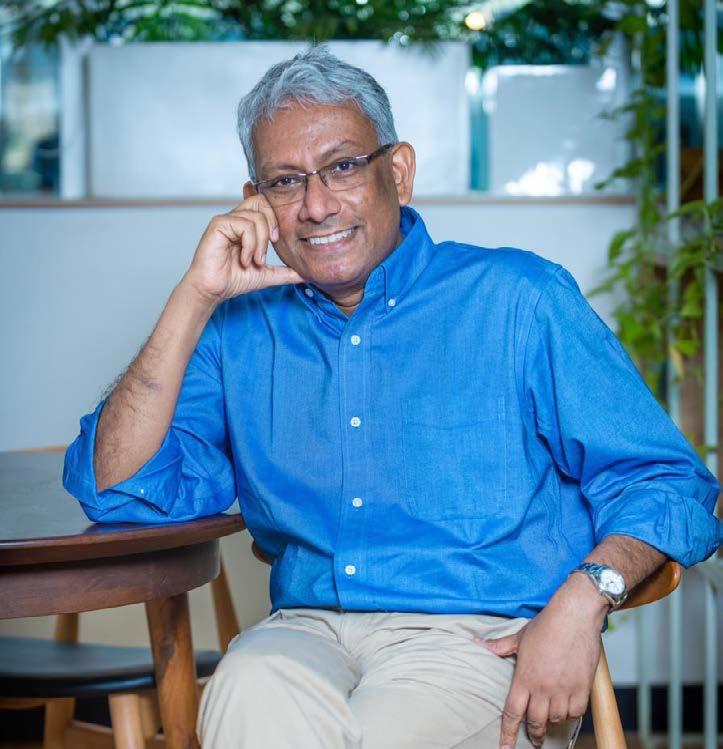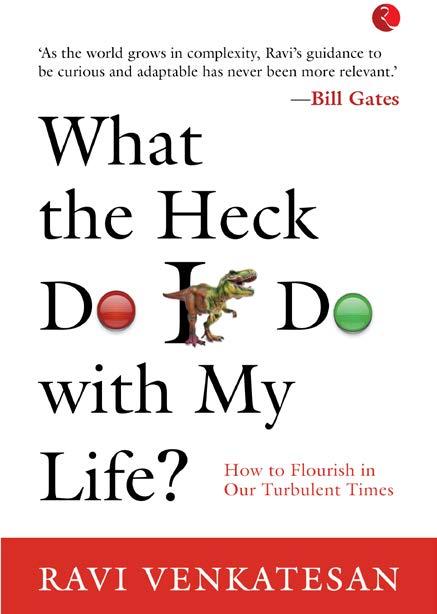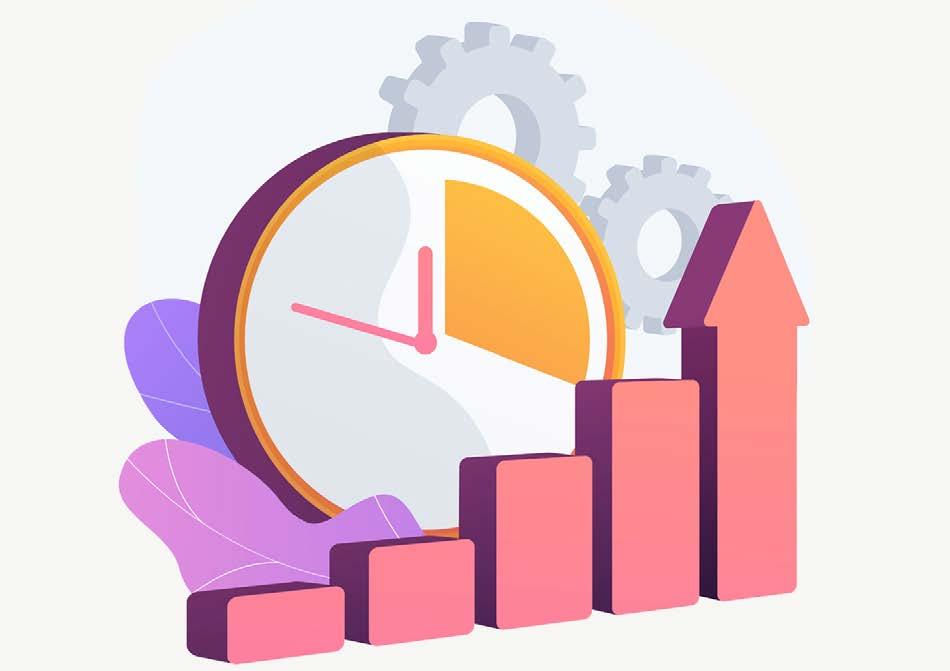
6 minute read
Moving the productivity pedal amid uncertainty
If we move away from the concept of productivity as output alone, and start to consider it as the achievement of results that match our purpose, we will find ourselves productive not just in the workplace, but in life as a whole by ravi Venkatesan
Productivity is an enormously important idea. However, we focus all too seldom on the productivity of what matters most - your life.
What is productivity? Mostly, we use the word as a sort of efficiency metric. It is an industrial era term used to measure and improve conversion efficiency. So, what is the output per unit of input? Output per person, or things per hour, per unit of material or energy. It is a very important and good way to measure the efficiency of machines or an industrial system. But it is not a good way to measure the outcomes created by knowledge workers or information workers, which we all increasingly are, and is certainly not a great way to measure your life.
Let us consider the knowledge work aspect. I recently released my new book called “What The Heck Do I Do With My Life? How to Flourish in Our Turbulent Times”. This book took me nearly six years to write, not because I was busy or lazy, but because it was a challenging creative effort. Do you measure the productivity of a writer by the number of books, or by the impact of those books? Do you measure the productivity of software developers or coders by the number of lines of error-free code they generate in a day, or by what that code achieves? The original version of WhatsApp had just 30,000 lines of code, and look at the impact that it has had.
If it is that hard to measure the productivity of creative effort, how do you measure the productivity of what we do with our life?

There is only one way to truly measure ‘productivity’
Did you achieve results that contribute to your purpose? That’s the only way to
truly measure ‘productivity’. If you are going to live a productive life, you need to have a clear sense of purpose. Mark Twain famously said, “there are only 2 days that matter: the day you were born and the day you figure out why.” It’s very important that each one of us asks ourselves this question – why am I here?
Some few people are fortunate enough that very early in life, they discover what their life is about. For most of the rest of us, finding our purpose is a quest. It takes years of intentional effort and experimentation. Even Mahatma Gandhi took years to figure this out.
One of the reasons it is difficult to discover our purpose is because too many of us have also fallen into a trap of living someone else’s life. From early childhood, we are conditioned to obey and please. We are rewarded for doing what our parents or teachers want. Later on, we are rewarded for doing what our manager wants or being successful in societal terms. In the process, we completely lose sight of what we want.
Of course, this is not a new phenomenon. 2,000 years ago, the Roman emperor Marcus Aurelius wrote in his book ‘Meditations’: “It never ceases to amaze me that we love ourselves above all others but care more about their opinion than our own”. More recently, Steve Jobs in a famous speech at Stanford said “Your time is limited, so don’t waste it living someone else’s life. Don’t be trapped by living with the results of other people’s thinking. Don’t let the noise of others’ opinions drown out your inner voice. Have the courage to follow your heart and intuition. Be you.”
How do we find a new and authentic purpose?
It is not possible to simply think your way to the answer. The only reliable way is to do a lot of ‘microexperiments’, where you try many different things. You then see what fits, what really gives you joy, what the Universe has in store for you, which doors open, and which ones remain firmly shut.
When I left Microsoft, I had no idea what I wanted to do, nor did I have a clear sense of purpose. So, I tried many experiments. I started writing, giving talks, and teaching senior executives. I dipped my toe into the social or development sector. With my friend and former Microsoft colleague Will Poole, we started Unitus Ventures, an impact-focused venture fund, and Social Venture Partners Banglore, which has grown to seven cities. I joined the boards of interesting companies like AB Volvo, Infosys and Bank of Baroda. In 2018, I finally realised two real purposes: First is tackling complex societal problems which require many different stakeholders to work together. For this, I started the Global Alliance for Mass Entrepreneurship or GAME. I also agreed to help UNICEF to create GenU to start a global youth movement. Second, helping people find

their path and discover their potential, which I decided to do through my writing and by giving talks. In this way, I found the most productive use of myself and all my intangible assets like my time, expertise, and network.
The Japanese have a concept called ‘Ikigai’, which says that you find meaning and satisfaction at the intersection of what you are good at, what you love and what the world needs. That’s when you are in a state of flow and highest productivity.
Now what prevents more of us from seeking and finding our purpose? It may be some combination of fear and greed. There is something called a “monkey law” which says ‘don’t release the vine you are holding until you have grabbed another’. We do this because we are afraid to go down a road less travelled. What if you fail? What if people laugh at you? Your family may get upset? Or there is greed… ‘let me make just a little more money, then I will go find my dream’.
This is all completely normal. Not everyone is in a position to cut the umbilical cord, nor do you need to. The point about microexperiments is that you can do them even as you hold down your full-time job and responsibilities. If you think you might enjoy working you fIND MEANING AND SAtISfActIoN At tHE INtERSEctIoN of wHAt you ARE GooD At, wHAt you LovE AND wHAt tHE woRLD NEEDS. tHAt’S wHEN you ARE IN A StAtE of fLow AND HIGHESt PRoDuctIvIty

for a startup, go spend your Saturdays with one. If you think you might enjoy teaching, start teaching a course part-time. If you think you want to move to the social sector, start volunteering. Through these experiments, you will learn what fits, what’s a good hobby and where your real purpose lies.
One of my mentors, the late Professor Jim March of Stanford said:
“In the end, we are very minor blips in a cosmic story. Aspirations for importance and significance are the illusions of the ignorant. All our hopes are minor except to us. But some things matter—mostly because we choose to make them matter. What might make a difference to us is if in our tiny roles, in our brief time, we inhabit life gently and add more beauty than ugliness.”
How do we inhabit and walk this earth more gently, and how can we use all our prodigious talent and potential to make life a little more beautiful? In the answer to that question, lies your purpose and the quest for your personal productivity.
ravi vEnKaTEsan is the former chairman of Microsoft India, founder of GAME, UNICEF’s Special Representative for Young People and Innovation and author of “What the Heck Do I Do with My Life? How To Flourish in Our Turbulent Times”.







